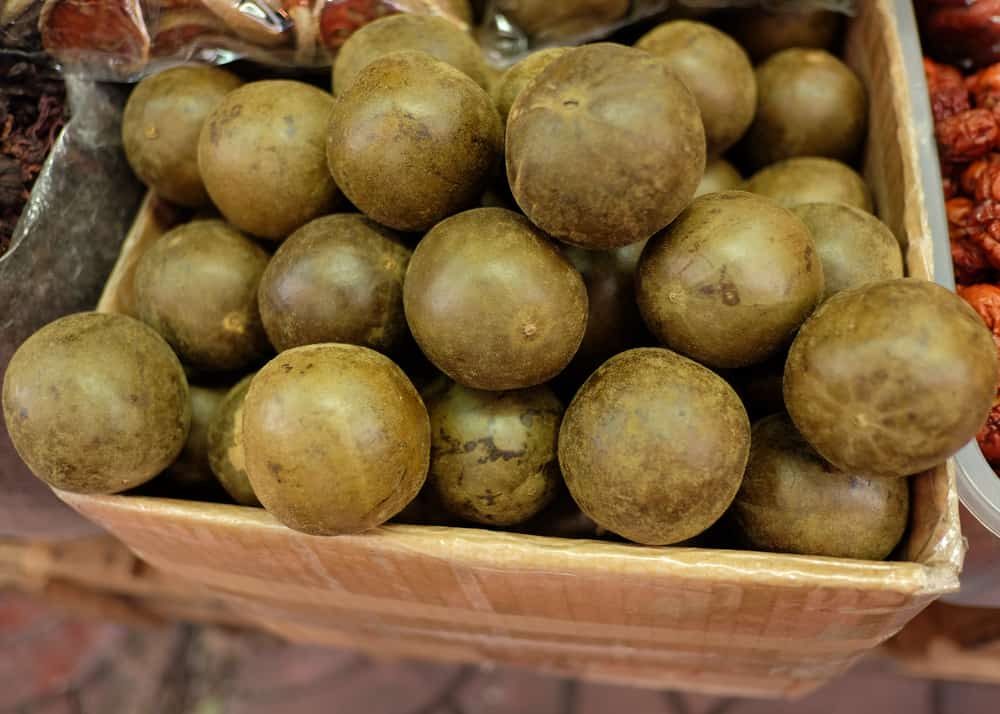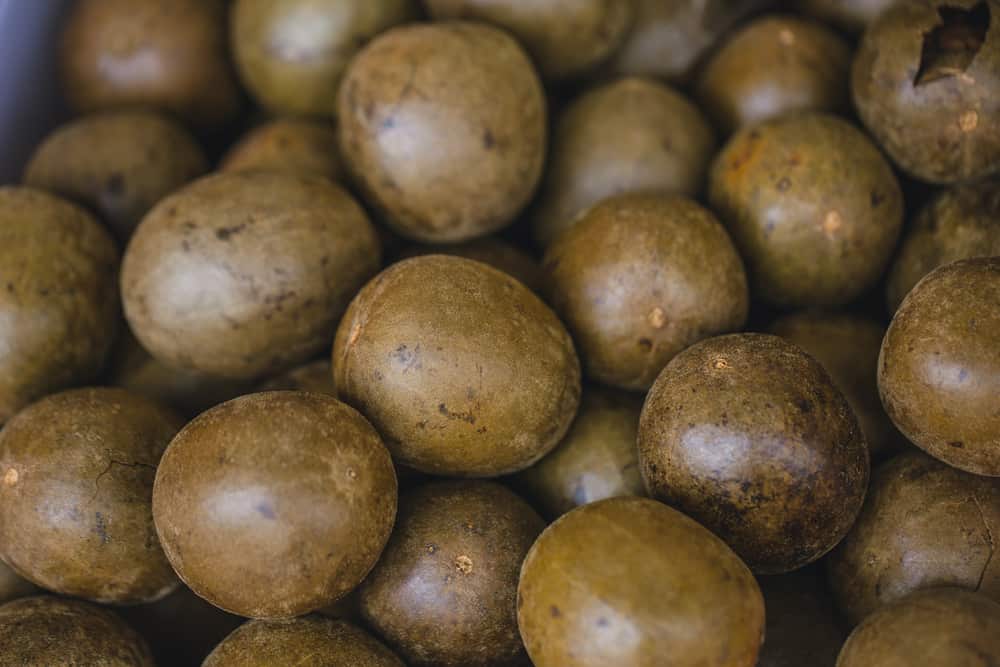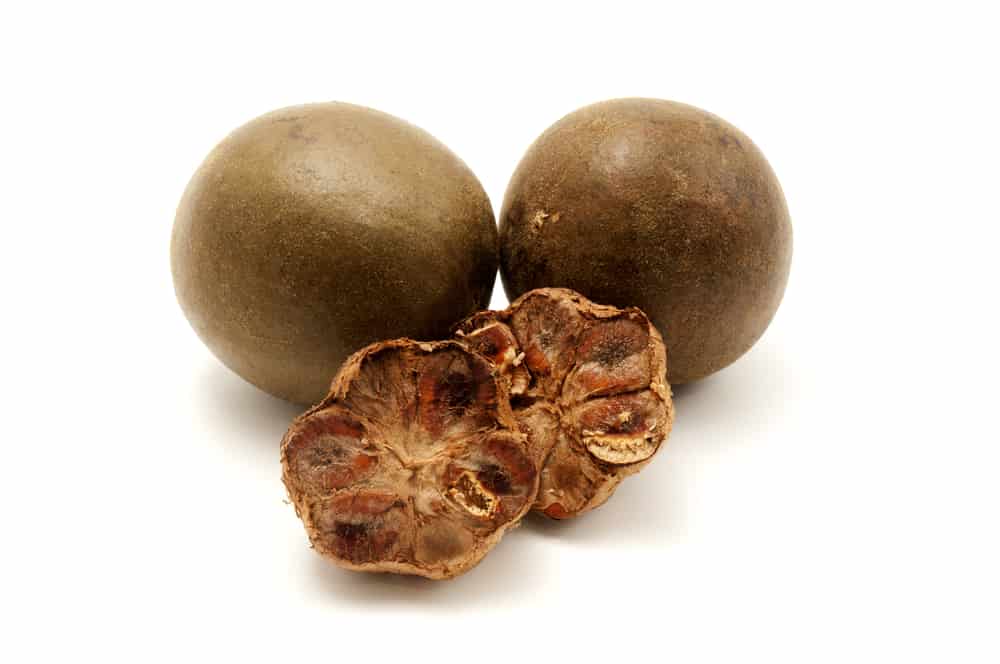
Monk fruit is the new alternative sweetener that is getting all the buzz.
It’s 300 times sweeter than sugar, and in parts of China, they even believe it makes you live longer.
Let’s examine monk fruit and see what all the fuss is about, and find out if it really is better than sugar.
What is Monk Fruit?
Monk fruit is the gourd-like fruit of a vine that is native to southern China and northern Thailand.
The fruits are also called Luo han guo or lo han kuo, but the colloquial name “monk fruit” comes from its long association with Buddhist monks in China.
It was first imported into the West in the early 20th century but has only been studied and cultivated since the 1980s.
In Europe, it is still classified as a “novel food” and is not yet approved for consumption.
Mature monk fruit is round, with a hard rind covered in fine hairs, and somewhat resembles a kiwi.
It is usually either eaten fresh or dried because the fresh fruit is difficult to store.
When dried, it turns brown and becomes more bitter.
To make a sweetener, the fresh fruit is pureed, homogenized, and the bitter compounds are evaporated.
Is Monk Fruit Safe for Use?
Because monk fruit has not yet been extensively studied, there isn’t a lot of scientific data to back up some of the more impressive health claims people make about it.
However, it has been proven to be safe and non-toxic. It is generally recognized as safe by the USFDA and has been enjoyed in Asia for centuries.
It is expected to be approved by the EU within the next year.
Is Monk Fruit Healthy?
Monk fruit has been used in traditional Chinese medicine for centuries.
However, there is a broad range of health claims being made about monk fruit that aren’t necessarily backed up by science.
When we talk about whether monk fruit is healthy, there are usually two important components to consider: Is it healthier than sugar, and does it actually have health benefits of its own?
Let’s look at each of these.
How Does it Compare to Sugar?
Monk fruit is often sold as a healthy alternative to sugar. It tastes hundreds of times sweeter than sugar, and yet has no calories.
Most importantly, monk fruit extract does not affect the body’s blood sugar levels as sugar does, because its sweet-tasting components are chemically different than the sweeteners in sugar.
However, many monk fruit extracts aren’t pure and may be mixed with other sweeteners and sugary ingredients.
In that case, while monk fruit itself is healthier than sugar, the specific monk fruit extract product may not be.
Benefits of Using Monk Fruit Sweetener?

In Traditional Chinese Medicine, monk fruit is used to help clear the lungs and treat coughs and sore throats. It also treats inflammation and intestinal disorders.
In the West, several scientific studies of monk fruit have been performed on rodents, with interesting results.
Here are some of the positive preliminary areas for future study:
Anti-Diabetes
Monk fruit is a sweetener that does not affect the body’s blood sugar levels, so it’s recommended for those with diabetes and blood sugar issues.
Several studies have explored the ways in which monk fruit interacts with diabetic rodents, and many of them demonstrate that monk fruit improves blood sugar and insulin sensitivity, while also benefitting cholesterol levels.
This research also suggests that monk fruit may help to generally reduce the effects of some metabolic disorders.
Anti-Cancer
Excitingly, monk fruit compounds have been shown to decrease the proliferation of cancer cells in mice with colorectal and throat cancers.
Antioxidant
Studies also show that monk fruit extracts are potent antioxidants and free radical scavengers.
Other Health Benefits
This review of over 90 sources suggests that monk fruit may have a much broader range of health benefits, including protecting the liver, regulating the immune system, fighting microbes, and more.
All in all, it’s clear that monk fruit has a beneficial effect on the body, and warrants further study in treating diseases and disorders.
Monk Fruit vs. Stevia

Monk fruit and stevia are both plants that are naturally sweet, have zero calories, and have minimal effects on blood glucose levels (pure stevia has a slight effect on blood sugar, while pure monk fruit does not have any).
Both monk fruit and stevia:
- Are over 200 times sweeter than sugar
- Are better than sugar for blood sugar levels and glycemia
- Are heat-tolerant and can be cooked with
- Have antioxidant and free-radical scavenging properties, and both fruits show some promising anti-inflammatory and immunomodulatory effects
It’s also important to point out that both stevia and monk fruit are often sold as products with a number of other, less healthy, sweetening and flavoring ingredients that reduce the health benefits of both plants.
While we don’t yet understand how monk fruit affects cancer cells, protects the liver, and affects metabolic disorders, it does show more promise than stevia.
Related Questions
What are the side effects of monk fruit?
Monk fruit has no known side effects and has been studied and proven nontoxic.
However, there is always the risk of an allergic reaction among people who are allergic to other gourds like pumpkin, squash, or melons.
What does monk fruit taste like?
Monk fruit tastes sweet and slightly fruity, depending on the specific preparation and product.
Is stevia or monk fruit better for you?
In a head-to-head competition, monk fruit is better than stevia because monk fruit has some potential health benefits that stevia does not have.
Related Article: Lakanto Monkfruit Sweetener, sweetest box ever!

